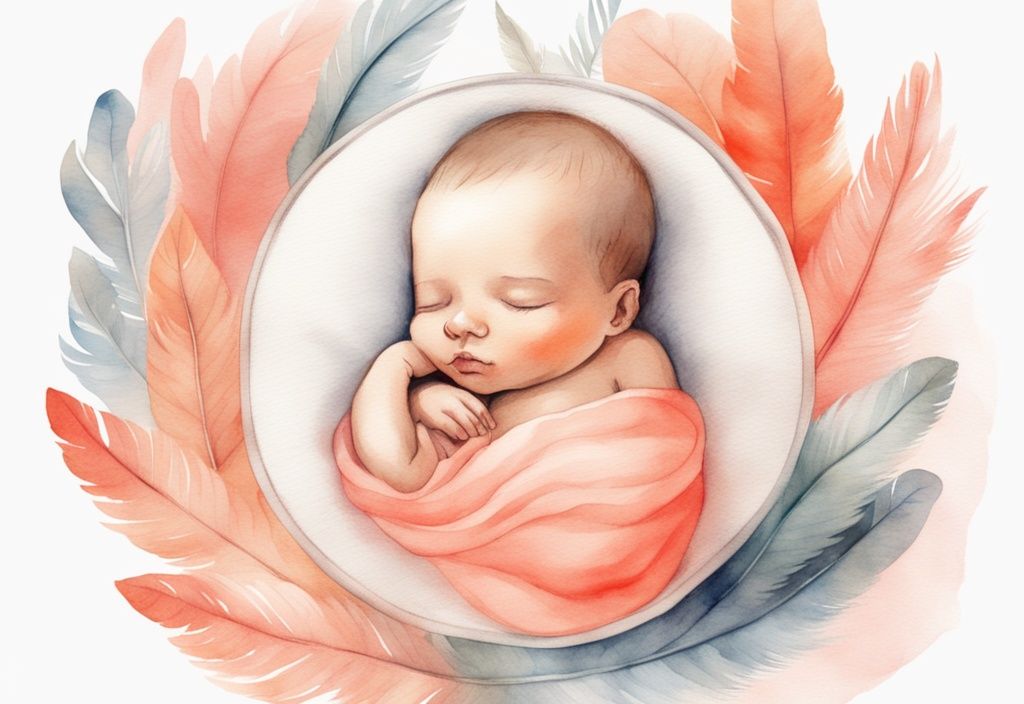You know, as a mother of two, I’ve heard the term “Angel Baby” more times than I can count. It’s a phrase that’s close to the hearts of countless parents, representing a compassionate way to refer to a pregnancy or infant loss. If you’ve found yourself here, You’re probably wondering, “What exactly is an Angel Baby?”
In this article, we’ll delve into this tender term, offering understanding and supporting you on this emotional journey. We’ll explore how the phrase helps parents grapple with a deeply personal grief, without shame or blame, and fully embrace the beauty of memory and love.
As we navigate this path together, remember, our shared experiences reinforce our sense of community. So let’s honour the purity and spiritual peace behind the “Angel Baby”, and support each other through grief’s unique path.
Decoding the Term: Angel Baby
For those navigating the profound grief of losing a child through miscarriage, stillbirth, neonatal death, or other perinatal incidents, “Angel Baby” is a term that brings a sense of comfort. It’s a poignant way to describe a little one who was gone too soon. This tender phrase also encompasses children lost to infant deaths, SIDS (Sudden Infant Death Syndrome), and similar heartbreaks where a child didn’t get the chance to grow up.
What Does “Angel Baby” Mean?
“Angel Baby” is a term soaked in love and sorrow. It gives grieving parents a tiny beacon of solace, suggesting that their sweet child has become an angel. Phrases such as “You’re now a mommy to an angel,” “She just received her angel wings,” and “Now he’s your very own guardian angel” wrap the grieving in a cocoon of understanding and support. These sentiments capture the deep love and enduring memories parents cling to during such a tremendously challenging time.
The Origin of the Term “Angel Baby”
This comforting term is relatively new, having taken root in the last 5-10 years. It’s widely embraced within various communities, support groups, and organizations focused on supporting grieving families. The beauty of “Angel Baby” lies in its ability to create a bond among bereaved parents—a shared language that helps them feel less alone in their sorrow. Through this, parents find a sense of community, knowing that others truly understand their grief.
Emotional Resonance of the Term “Angel Baby”
Recognizing and validating the emotional experience of parents who have lost a child is crucial in their grieving process. The term “Angel Baby” plays a significant role in this context. By using this specific term, families and loved ones can acknowledge the profound loss and create a supportive environment where grief is respected and understood.
Speaking of an “Angel Baby” helps families and communities make space for their grief, allowing them to express their sorrow and begin the healing process. Understanding what is an angel baby and using this term can validate the emotional turmoil parents feel, making it a pivotal aspect of their journey through grief.
The Healing Power of the Term
For many parents, hearing others refer to their lost child as an “Angel Baby” provides solace and a sense of recognition. It is essential to address the baby by the name the parents have chosen, as this personal touch acknowledges the baby’s individuality and significance.
This specific term helps parents process their grief more healthily, offering a comforting acknowledgment that their baby’s existence mattered deeply.
Discussing the Angel Baby using the chosen name also fosters an environment where the child’s memory is kept alive, despite their short existence. The emotional comfort derived from this acknowledgment can help parents navigate their loss with a bit more ease, providing them with a supportive foundation upon which to build their healing journey.
Recognizing Grief through Angel Baby
The devastation of losing an Angel Baby is a profoundly life-altering experience for parents and their families. This grief is deeply personal, unique to each family, and can be compounded by societal pressures to quickly return to normalcy. Understanding what is an angel baby involves recognizing that the grieving process is not linear and needs time and respect. Families may struggle with external expectations and judgment, making their grieving process more challenging. For parents seeking comfort and routine, learning how to effectively swaddle a baby can be a helpful practice. The term “Angel Baby” helps create a space where their pain is acknowledged and validated, allowing them to grieve at their own pace. By recognizing and respecting this grief, communities and loved ones can support parents as they navigate this incredibly painful period, fostering a more compassionate and understanding environment.

Cultural and Religious Influence on the Term “Angel Baby”
Different cultures and religions have unique ways of interpreting the term “Angel Baby,” reflecting their diverse beliefs about life, death, and the afterlife.
Interpretations in Different Spiritual Contexts
The concept of what is an angel baby can differ significantly among various spiritual traditions.
In Catholicism, the belief is that humans do not transform into angels upon death. Angels are considered a distinct form of creation, separate from human beings. According to Christian theology, angels are purely spiritual entities without physical bodies, while humans are seen as a union of body and soul.
This unified human existence continues after death, leading to a reunion in the resurrection. Therefore, in Catholicism, the deceased, including infants, are regarded as saints rather than angels. Saints in heaven are believed to possess both body and soul and can intercede for those on earth, providing a different form of spiritual comfort distinct from the angelic imagery.
Reflections of the Term in the Secular World
In contrast to the religious perspective, the secular interpretation of what is an angel baby emphasizes emotional and commemorative aspects.
Without adhering to specific religious doctrines, secular reflections use the term to offer comfort, support, and remembrance for grieving families. Items like “angel day” jewelry and memorials adorned with angel wings are prevalent in secular settings as tangible symbols of loss and love.
Furthermore, families often engage in rituals such as lighting candles or releasing balloons to honor their angel babies. These acts provide a sense of healing and remembrance, focusing on the emotional resonance rather than theological precision.
By understanding these various interpretations, individuals can provide sensitive and appropriate support to grieving parents, respecting their cultural and religious beliefs while acknowledging their loss.
Support Resources for Parents Experiencing the Loss of an Angel Baby
Losing a child is a deeply traumatic experience, and parents dealing with the loss of an Angel Baby often need specialized support to navigate their grief. Numerous resources, including support groups and online communities, provide essential emotional assistance, information, and a platform for sharing stories and experiences, giving grieving parents a semblance of solace and understanding.
Professional Services and Programs
Programs such as Angel Babies/Bebitos Angelitos offer critical support to families who have lost an Angel Baby or are expecting a child diagnosed with a terminal condition. This program assembles a compassionate team of nurses, social workers, chaplains, and volunteers who provide comfort and assistance in identifying valuable resources.
Key services include:
- Specialized support groups tailored to meet the unique needs of grieving parents
- Comprehensive bereavement support for family members
- Regular follow-up calls to check on emotional well-being
- Grief support mailings that offer continuous assistance through various stages of the grieving process

Finding Solace in Community and Online
Many parents find comfort and support through online communities and social media groups dedicated to those who have experienced similar losses. These platforms provide an accessible space for parents to share their personal experiences, garner support, and connect with others facing the same heartbreak.
Hospitals and healthcare providers also play a vital role by offering immediate support resources, including counseling services and commemorative options that help parents honor their Angel Baby’s memory while working through their grief.
Parents grappling with the loss of an Angel Baby are not alone. Engaging with professional services and community support, both in-person and online, can significantly aid in the difficult journey towards healing.
Commemoration of an Angel Baby
Commemorating an angel baby is a vital part of the healing process for many parents. It allows them to honor the memory and significance of their lost child, providing a way to celebrate and remember in a meaningful way. Understanding what an angel baby means helps families foster a connection that transcends loss.
How to Memorialize Your Angel Baby
One way to memorialize your angel baby is through personalized funeral and memorial planning services. These services offer compassionate support and help navigate the emotional and logistical aspects of saying goodbye. Memorial events provide a structured and communal space to honor your angel baby.
An “Angelversary,” marking the date of your child’s passing, serves as a poignant annual reminder. It’s an opportunity to celebrate your child’s life and legacy. Participating in such events helps families recognize and validate their loss, ensuring that their child’s memory remains alive in a supportive and nurturing environment.
Unique Rituals and Ceremonies
Unique rituals and ceremonies offer various ways to pay tribute to your angel baby. Lighting a candle can symbolize the enduring presence of your child’s memory. Releasing balloons may offer a moment of peace and reflection.
Symbolism plays a significant role in these commemorations. Items like angel wings, halos, or specific animals that hold personal meaning often serve as tokens of remembrance. Special events, such as the Angel Baby Walk/Run, act as memorial ceremonies and also serve as fundraisers to support ongoing initiatives for bereaved families. These activities foster a sense of community and solidarity among participants, further aiding the healing process.
Misunderstandings About the Concept of an Angel Baby
The concept of an Angel Baby offers solace to many parents who have experienced the tragedy of losing a child. However, misunderstandings about what an Angel Baby means can sometimes complicate the grieving process for these parents and their communities.
Clearing Up Common Misconceptions
One common misunderstanding about what is an Angel Baby stems from theological viewpoints. In certain religious traditions, particularly within various Christian denominations, the term may be unsettling because it conflicts with specific beliefs about human dignity and the nature of angels. These parents may prefer to use the term “saint,” which aligns more closely with their faith and acknowledges the unique status of humans versus angels.
Additionally, not every parent who has experienced the loss of a baby finds the term Angel Baby comforting. For some, the label may inadvertently seem to soften or diminish their profound loss. These parents often prefer to refer to their lost child simply as their son or daughter, to fully honor their grief and maintain the personal connection they feel.

Impact of Misunderstandings on Grieving Process
Misunderstandings about what is an Angel Baby can significantly impact the grieving process. For parents who do not find comfort in this term, its usage can feel alienating or isolating. They may find themselves excluded from communities that predominantly use the term, hindering their ability to process their grief within a supportive network.
Moreover, the term Angel Baby might sometimes lead to miscommunication or create discomfort among those grieving parents who prefer more direct language. They may feel that referring to their loss as something angelic undercuts the gravity of their experience. Therefore, it’s vital to use language that respects each parent’s individual grieving journey, ensuring that their feelings and preferences are always considered.
Conclusion
The term “Angel Baby” offers a heartfelt and gentle recognition of loss for parents grieving a child who did not survive into adulthood. This terminology, which emerged in recent years, helps provide solace and support to parents during an incredibly challenging time.
In understanding what is an angel baby, it is essential to recognize the emotional weight behind the term. Assigning the title “Angel Baby” to a lost child acknowledges the profound love and connection parents continue to feel. It also gives them a way to express their grief and the memory of their child.
However, using this term requires careful consideration of individual preferences and cultural or religious beliefs. For many, the term brings comfort and a sense of community, helping them to validate their emotions and remember their child in a tender, meaningful way. But it may not resonate with everyone, emphasizing the importance of sensitivity and respect for each family’s unique grieving process.
Conclusively, the term “Angel Baby” plays a significant role in the trajectory of grief, providing an emotional anchor for many. Simultaneously, it is crucial to remain mindful of its diverse interpretations and the necessity to support grieving families according to their specific needs and beliefs.
Frequently Asked Questions
What Does It Mean When a Baby is Referred to as an “Angel Baby”?
When we talk about an Angel Baby, we’re referring to a precious little one who has passed away either during pregnancy, through miscarriage or stillbirth, or shortly after birth. It’s a tender term that signifies the belief that the baby has become an angel, bringing a sense of peace and comfort to grieving parents.
What is the Importance of Using the Term “Angel Baby”?
Using the term “Angel Baby” is incredibly important because it acknowledges and validates the deep emotional experience and loss for parents and families. This gentle term provides a comforting recognition of the baby’s existence and significance. It’s a way to connect with a community of shared grief and support, offering solace and understanding during such a difficult time.
How Can Parents Cope with the Loss of an Angel Baby?
Coping with the loss of an Angel Baby can feel overwhelming. It’s helpful to seek out support resources like specialized programs, bereavement support, and professional counseling. Finding comfort in community and online support groups can also make a big difference. Many parents find participating in memorial events and rituals, such as lighting candles or creating memory boxes, to be a meaningful part of the healing process.
How to Honor the Memory of an Angel Baby?
Honoring the memory of an Angel Baby can take many forms. Some parents choose to hold ceremonies or participate in rituals like lighting a candle or releasing balloons. Others might commemorate their “Angelversary” with special events. Using symbols that hold personal meaning, such as angel wings or halos, can also be a beautiful way to remember and celebrate their short but impactful life.


